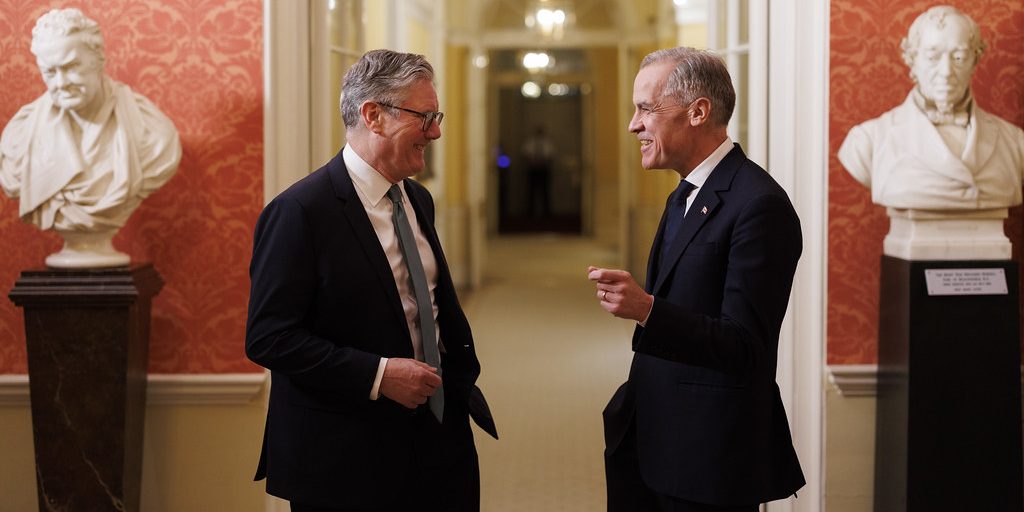New U.K. trade strategy IDs Canada as ‘key partner’ to boost economy, procurement opportunities

Canadian firms could gain easier access to procurement and trade opportunities in the United Kingdom under its new trade strategy that identifies Canada as a “key partner,” and contains language which observers say signals “deepening commitment.”
The U.K.’s Trade Strategy unveiled on June 26—its first since Brexit—aims to boost the country’s economy by attracting foreign investment, cutting red tape in procurement, simplifying trade rules, and injecting billions of pounds in funding for high-growth sectors.
The new strategy defines strengthening ties with key partners, such as Canada, as an “obvious priority,” building on Prime Minister Mark Carney (Nepean, Ont.) and U.K. Prime Minister Keir Starmer’s June 15 commitments to deepen the bilateral relationship.
The message from London was echoed by the high commission in Ottawa. In a June 30 statement, British High Commissioner Rob Tinline defined Canada as a “key partner” in the U.K.’s efforts to boost its economy by “making it easier, faster, and more attractive for international firms to invest.”
In the same statement, the U.K.’s trade commissioner for North America, Oliver Christian, said, “Whether you’re a Vancouver life sciences company looking to unlock innovation or a Toronto tech firm ready to expand internationally, the U.K. is creating the ideal environment for international businesses to thrive.”
Carney committed to introducing legislation when Parliament resumes in the fall to ratify the U.K.’s accession to the Comprehensive and Progressive Agreement for Trans-Pacific Partnership (CPTPP). This would give U.K. and Canadian suppliers greater access to procurement opportunities. The CPTPP’s member countries include Australia, Brunei, Chile, Japan, Malaysia, Mexico, New Zealand, Peru, Singapore, and Vietnam.
The new strategy’s aim is to “kickstart economic growth by putting international partnerships at its core,” Alan Gogbashian, the U.K.’s deputy trade commissioner for North America, told The Hill Times in a July 7 email.
When asked how new strategy could affect business and procurement with Canada, Gogbashian pointed to the U.K.’s Procurement Act which came into force this past February. He said the reforms remove barriers for new entrants and small and medium-sized enterprises by reducing paperwork, standardizing procedures across authorities, and cutting bid costs.

“Improvements to our central procurement portal also mean Canadian and U.K. firms alike will benefit from full digital tendering across departments,” Gogbashian said.
“Once Canada ratifies the U.K.’s accession [to the CPTPP], Canadian firms will gain guaranteed access to more U.K. procurement markets on top of what is already covered by the existing trade agreement between the U.K. and Canada,” he said.
Further commitments were made in June with Carney and Starmer agreeing to establish a new U.K.-Canada Economic and Trade Working Group, which is expected to address trade barriers, extend co-operation in areas such as critical minerals and artificial intelligence and infrastructure, and report its findings to both prime ministers within six months.
Gogbashian said the U.K. officials are “frequently in touch with Canadian counterparts at all levels of government and across a range of sectors, including procurement,” and added that the findings of the working group will inform future steps. “We’ll look forward to seeing how its findings might benefit procurement,” he said.
The strategy also sets out a $37.5-billion expansion for the U.K. Export Finance (UKEF)—the country’s official export credit agency—bringing its total lending capacity to $150-billion. UKEF provides financing and insurance to exporters, and provides guarantees on loans made to international buyers to finance the purchase of goods or services from a U.K supplier.
The U.K. is Canada’s third-largest trading partner, behind the United States and China. In 2024, Canada exported $28.3-billion worth in goods to the U.K., and imported $9.8-billion.
Gogbashian highlighted that Carney and Starmer agreed on further collaboration across a range of sectors—including semiconductors, quantum, digital, AI, biomanufacturing, and civil nuclear—as well as an enhanced defence and security partnership.
The U.K. government signed a Memorandum of Understanding (MoU) with Canadian AI firm Cohere on June 16 to explore the use of AI in health care, finance, defence, and national security.
Canadian Commercial Corporation also signed a MoU with UKEF this past spring, under which UKEF will provide financing to eligible international buyers using Canada’s government-to-government contracting model.
‘There’s an open door for Canadians who want to do business with Britain’: Robertson
Though concrete benefits have yet to materialize, observers agree that strong political messaging—if backed by action—could translate into meaningful economic opportunity for both countries.
Andrew Percy, a former British government minister and trade envoy to Canada who currently serves as vice-president at Crestview Strategy, told The Hill Times in a July 4 interview that the combination of the “very warm” comments from both Carney and Starmer on the bilateral relationship over the last month, as well as the recent mention of Canada as a key partner in the U.K.’s new trade strategy are positive signs.
“We don’t have a lot of detail yet, and these documents are high level, but the key takeaway for Canadian businesses looking at the U.K. is that there’s clearly a commitment on both sides to greater alignment and a deeper trading relationship,” Percy said.
“That is obviously of interest to business and will provide opportunities. And access to public procurement is key, given how much governments actually spend.”
Percy underlined that both countries’ prime ministers are facing similar pressures to diversify trade. The U.K. is trying to reduce reliance on the European Union while still maintaining critical ties to the bloc, and Canada is attempting to do the same with the United States amid President Donald Trump’s consistent tariff threats and annexation rhetoric.
“Take all that together, then you have a clear commitment on both sides to deepen the trade relationship, which of course means much more opportunity for Canadian businesses,” Percy said.
Greg Quinn, a retired British diplomat and a member of the Governing Council of the Canada–U.K. Council, told The Hill Times in a July 4 interview that Britain’s push for closer alignment with allies reflects a broader need to recalibrate on the global scale.
“There’s been a very clear idea that we need to look at our group of like‑mindeds—of which Canada is one—and work more closely with them, and to diversify away from the U.S. because maybe we’ve all become a bit too reliant on them,” Quinn said. “We live in a somewhat different world today than we did even 12 months ago with what is happening with the U.S.”
When Starmer’s Labour government came to power in the U.K. in July 2024, ending 14 years of Conservative rule, it did so with a “very clear” understanding that it needs to build industry and attract investment into the country, according to Quinn.
“And to do that, you need to make it simpler. You need to simplify the procurement rules, you simplify the accounting rules, you simplify the tax rules, etc.,” he argued.
“What we want to do in the U.K., I think, is to make it as simple as possible for companies—like those from Canada—to invest and procure in the U.K. It’s [about] making it as easy of a process, removing non-tariff barriers that might exist. We want to hopefully make it easier for U.K. companies to invest into Canada.”
Quinn argued that a strong trade relationship between the two countries already exists with multiple large Canadian firms such as Lightspeed, Strata, Magellan Aerospace, and TD Securities being already well established in the U.K., but underlined that difficulties still exist with British companies investing in Canada, partly due to differences between provinces.
Former Canadian diplomat Colin Robertson echoed that this country already has a preferential advantage in doing business with the U.K. through its partnerships under the World Trade Organization and the CPTPP. But the U.K. “targeting” Canada as a key partner in its recent trade strategy signals a deepening of ties, Robertson said as “there is more clarity, and it’s more concrete.”
“There is an open door for Canadians who want to do procurement or business with Britain,” said Robertson, who’s now a senior adviser at the Canadian Global Affairs Institute, adding that while it is very hard for governments to promote business, they ultimately create the framework to ease the rules and boost opportunities. “The British are certainly well-inclined,” he said.
With both countries increasing their defence spending, sources pointed to defence procurement as an obvious area where joint efforts can flourish. “Most likely prospects are going to be on the industrial defence side, because we’re both increasing investments in that area, and we already have long-standing partnerships there,” Robertson said.
One of the largest defence procurement projects between Canada and the U.K. is the River-class destroyer, touted as the largest and most complex shipbuilding initiative in Canada since the Second World War. The Canadian company Irving Shipbuilding is building the 15 warships for the Navy, which has an estimated cost of $60-billion, but U.K.-based firms such as BAE Systems and Rolls-Royce are also involved in the build, which is based on the U.K.’s Type 26 frigate design.
“Will Canadian businesses take advantage? That’s the question,” said Robertson. “We have these agreements that give us preference, but ultimately, it’s business that does business with business.”
ikoca@hilltimes.com
The Hill Times






 LICENSING
LICENSING PODCAST
PODCAST ALERTS
ALERTS













